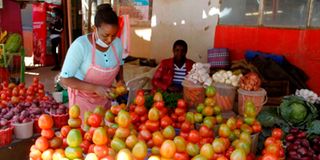New technology, collaboration key to scaling up small enterprises

Ms Pauline Wambui, a vegetable vendor at the Midrock bus stage in Narok town on September 1, 2020. The ventures our youth should focus on should not be confined to lofty white-collar opportunities. Rather, they should cover what more value can accrue to mama-mboga and boda-boda riders
The ever-creative and resourceful youth of Kenya readily come alive whenever they are convinced about an idea. In this day and age of the knowledge economy, artificial intelligence, big data and e-commerce, our youths should be supported to take up impactful, viable opportunities across all sectors of the economy.
The ventures our youth should focus on should not be confined to lofty white-collar opportunities. Rather, they should cover what more value can accrue to mama-mboga and boda-boda riders if, say, elements of e-commerce and data-driven decision-making become points of intentional focus.
Ever envisioned that simple ideas like mama-mboga and boda-boda could be a part of a major earth-moving and global value chain? Is this underestimated window of opportunity a potential avenue for the creation of multiple jobs and unexplored opportunities for entrepreneurship for our youth including university graduates?
Unfortunately, many of us view opportunities from cloudy lenses. By the way, have you ever pondered what kind of revenues mama-mbogas and boda-boda operators generate in a day?
You would be shocked if the cumulative revenues were reported to many comfortable office cogs!
That’s not all.
Age-old barter trade
Before I proceed let me dissect the M-Pesa phenomenon that has created thousands of opportunities, changed lives, and put Kenya on the global map. The inspiration that sired M-Pesa could be the concept of the age-old barter trade. The value of the goods that were exchanged in barter trade may have been arbitrary but the M-Pesa platform supports the exchange of value.
Today, mama mboga operates from a kiosk in some estates or on the busy and dangerous, dusty roadside where potential customers pass on their way to and from work. Whether the hygiene levels of the environment she operates in are acceptable or not, we still trust them because they are forever stationed at one spot and would not like to injure their reputation by being inconsistent. The question now is, can’t this business model be up-scaled?
The boda-boda operator on the other hand remains stationed at a predictable spot at the terminus of other means of transport.
This is where such means do not operate beyond and, therefore, offers the bikes offer the next means of transport.
The boda-boda riders benefit more when their customers are going to or coming from work.
The competitive advantage of boda-bodas, compared to matatus, is the fact that they take a shorter time to reach their destination when there are traffic snarl-ups. When the passenger flows are low, what else can boda-boda operators do? Can they double up as courier agents through a hailing platform? Can they ferry mama-mboga groceries to customers in an organised system powered by an e-commerce platform? For that to thrive, it is important to have a thorough understanding of existing business ecosystems and potential pathways of value chains and market opportunities.
The government can deploy personnel from relevant departments to enforce product quality and hygiene for edibles before packaging and delivery of goods made in cottage industries by mama-mbogas and transported by boda-boda riders. A way of rating both the product and the efficacy of delivery online would favour those deemed to have the best products and services.
The bodaboda guy would then be waiting to deliver the package to a digitally located destination through GPRS. The destination could be offices, residential quarters, packing bays, recreation centres, gyms, or even hospitality joints. Essentially, the boda-boda operators could upgrade to a logistics venture, just like that. The youth then would adopt the Jumia type of network to run several such ventures across the country, thanks to connectivity in the country.
This collaboration between their underutilised ventures could open up a world of ideas and opportunities. The whole idea is to take advantage of convergences and synergies to create multiple business opportunities for people serving the same profile of clientele. That way the beneficiaries of such a model of entrepreneurship would leverage each other’s strengths.
Medical tourism
Medical tourism in the country is one such successful industry that has set up examples our upcoming businessmen and women could emulate.
While healthcare specialists stick to their areas of expertise, they nonetheless work closely with their peers in different specialisations to offer wholesome services. This is a model to emulate for upcoming entrepreneurs offering products and services to a pool of clients with similar or related needs.
The most ideal model of growing mama mbogas and boda-bodas from small ventures into sustainable enterprises will need business incubation and training in basic business etiquette. That at the moment is the missing link to a thriving legion of successful business ventures in Kenya.
Mr Mwasi is CEO, Kenya Yearbook Editorial Board; [email protected]





